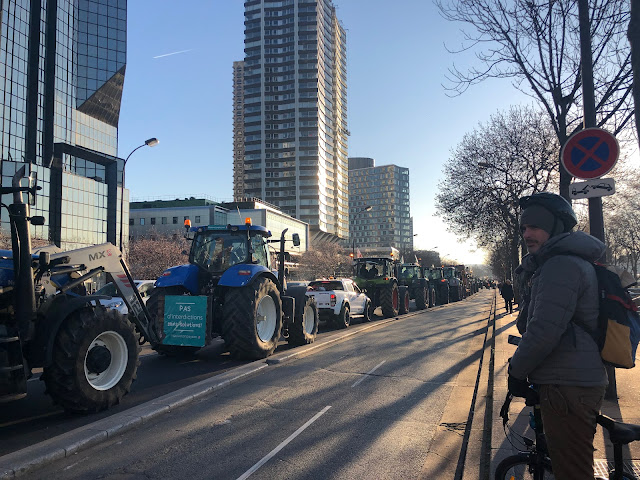Strike Day: A View From the 16th Arr.
France's President and Prime Minister are moving a proposal to change the pension system through the National Assembly. Under the current system, fully vested workers become eligible for full retirement benefits at age 62. The proposal under consideration--put forth as a way to keep the national social security system solvent for future retirees--would change the minimum retirement age to 64, with some leeway for people who entered the workforce in their early teens.
I don't have a dog in this fight, and have not read deeply enough to have an informed opinion on the issue. So I'll refrain from commenting on the proposal, or any other policies that are or are not being proposed to shore up what may or may not be a solvency crisis for the French pension system.
But as expected, the plan faces intense opposition--from a majority of the public, the left and right of the political establishment, and from organized labor. This has resulted in periodic strikes among transportation and energy workers, teachers, and civil servants over the last few months, as well as mass protests and demonstrations around the country. What is meant by "mass" varies depending on who is estimating the turnout. Organizers have claimed hundreds of thousands or millions, while police tend to provide much smaller estimates (e.g., in the tens of thousands).
 |
| Day 2 of a garbage strike--not too bad yet, but no end date announced. |
March 7 (or 7 March in the Euro-style of dates) was promised by organized labor to be the beginning of ongoing actions that will effectively shut down the entire country. Le Monde reported that the Interior Ministry estimated over a million demonstrators nationwide, while the largest union (la CGT) estimated 3.5 million. Paris police estimated 81,000 in the capital, compared to CGT's estimate of 700,000.
So how did things look to one ostensibly disinterested foreigner the 16th Arrondissement? So far pretty quiet. Then again, we're nowhere near the National Assembly or the Place de la Republique, symbolically important places of social action. But things appear to have been disruptive on the highways around Paris and at the Place D'Italie, where teargas was apparently used, and in places like Nantes and Rennes where police dispersed crowds with water cannons.
 |
| Farmers demonstrating in the neighborhood on 8 February |
Here are the few things that we experienced or noticed in the 16th, all very minor and, with one exception, not necessarily reflective of what else happened around the country and around Paris. And granted, I'm not employed or parenting children, so any impact on my day-to-day life would be minimal regardless.
- The biggest visible--soon to be olfactory?--sign of unrest in the neighborhood is the garbage starting to pile up. Sanitation workers began their own strike on Monday 6 March, making this day 2, with no resumption of service scheduled (that I'm aware of). Paris has a lot of cleaning crews working every day throughout the city, and garbage cans and recycling bins are plentiful and collected frequently. But even that is not really a match for the amount of dog shit, cigarette butts, and general trash that a city this size can generate. So while the streets are still pretty orderly (all things considered), it's going to get very dirty, very fast. As a social movement strategy, it's tempting to think that letting the trash pile up risks turning the public against your cause. But unlike vintage garbage strikes (NYC in the 1970s or Memphis in the 1960s, for example), in this case the cause is likely seen as much larger than the demands of sanitation workers on the government. The risk of overplaying their hand may be lower--but only up to a certain point. Then again, during the Commune of 1870-1871, besieged Parisiens ate rats, cats, dogs, and zoo animals rather than capitulate. If any of that spirit remains, they might not wither in the face of a few thousand mounds of trash.
- We cut short a weeklong rail trip to Bordeaux and the Poitou-Charentes region by one day. The national railway (SNCF) had been warning of disrupted or cancelled rail service on 7 March, so we rescheduled ahead of time to return 6 March instead. Sure enough, our original train was in fact cancelled, so we got away with one. SNCF and local transportation authorities expect ongoing disruption on 8 March and beyond.
- Several metro (subway) stations in the neighborhood were fully or partly closed, as were some important transfer stations linking the 16th to other parts of town. Bus service was reduced, but I saw still saw several making the rounds and very little traffic backups--which would be expected if people opted for cars instead.
- The neighborhood grade school was apparently closed, if the weekend-like quiet was an indication. On the other hand, the playgrounds at nearby Parc Sainte-Perrine should have been very busy if the kids were not in school. Perhaps families went to demonstrate together. Instead, it looked like a normal day of mostly toddlers and their mothers or nannies.
- I've seen French Marines patrolling tourist areas and near government buildings--but today was the first time I've seen any in the 16th. Just two soldiers, certainly not a show of force or intimidation, and maybe just a coincidence.



Merde!
ReplyDelete